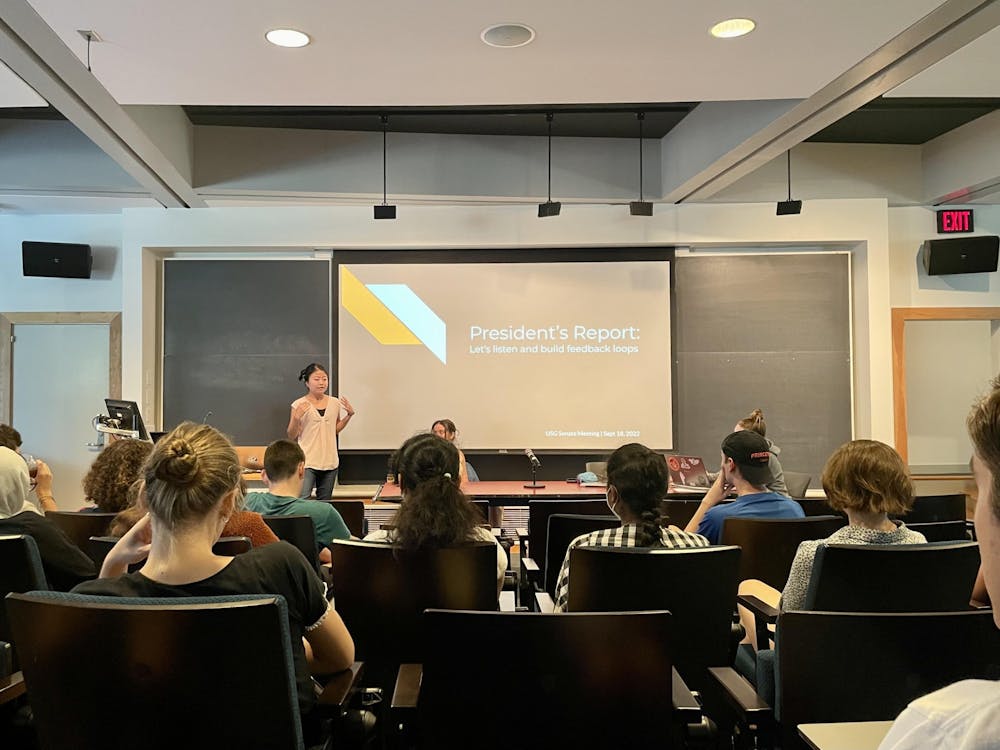The USG Reform Project has proposed a change to the USG referendum process. While most student petitions that gather enough signatures would formerly be put to the student body, the proposed reform suggests instead that issues go to a USG hearing, and the USG alone would decide which issues should be put to the student body.
We asked our columnists for their Reactions to this monumental proposed change.
This move would defeat the purpose of a referendum
By Christofer Robles, Contributing Columnist
In abolishing the referenda process and proposing oligarchical hearings in their place, the Undergraduate Student Government (USG) misunderstands the purpose of a referendum and the purpose of the USG.
Referenda exist as one of few democratic vehicles for collective action that the student body has. The very definition of a referendum is “the principle or practice of submitting to popular vote a measure passed on or proposed by a legislative body or by popular initiative.” Referenda are the solution to a, at times, greatly inaccessible and cryptic USG.
Referenda engage and distribute power. Moving to a system where the USG has discretion whether to hear the student body seems to both dissuade engagement with the USG and consolidate power to a few students. The USG plays an important role in elevating students’ concerns, but it should not seek to over-arbitrate and filter out student perspectives. In the event of a truly unreasonable or destructive proposition, the USG already has a republican solution: determining frivolous referenda by a five-sixths vote and preventing their passage. Blocking anything with less than this would be tyranny.
If the USG wishes to fulfill its purported preamble dedication to “the proposition that students must be included in the making of decisions that affect them,” they should leave referenda as they are.
Christofer Robles is a sophomore contributing columnist from Trenton, N.J. Christofer can be reached at cdrobles@princeton.edu or on Instagram @christofer_robles
We need opportunities for discourse beyond a USG referendum
By Abigail Rabieh, Columnist
Referenda are valuable forms of discourse; currently, they are one of the only ways to encourage widespread controversial political discussion. The Caterpillar referendum of Spring 2022 sparked vigorous and intense debate throughout the student body — demonstrated vividly in the Opinions section of the The Daily Princetonian. Though its end was unsatisfactory, a hard-fought referendum should not be perceived as an undesirable campus event or an unwelcome aberration on an otherwise calm campus. President Eisgruber states that “universities should foster rigorous, constructive, truth-seeking discussions about questions of consequence.” I agree; the University should be a place where students explore their opinions and become galvanized to fight for what they believe in. Princeton should not exemplify apathy, but motivation.

We need to maintain this opportunity for discourse. But perhaps USG is not the best place to arbitrate these essential debates.
It is generally acknowledged that student referenda have little to no effect on the administration. Thus, the USG has no productive role to play — the point of a referendum is to start conversations, not enact a policy. Students should take advantage of the fact that they live in a small community where we have other ways to engage with each other. If USG wants to step back, Whig-Clio — the “nation’s oldest collegiate political, literary, and debate society” — should take over the campus space for rigorous political discourse by starting these conversations at a campus-wide scale. This move could be for the better — students could focus less on political rhetoric poised to win votes and learn more about deeply engaging in discussion and, maybe, coming to a solution.
Abigail Rabieh is a sophomore columnist and prospective history concentrator from Cambridge, Mass. She serves as co-captain of the Princeton Model United Nations team which is affiliated with Whig-Clio. She can be reached by email at arabieh@princeton.edu, on Instagram at @a.rabs03, or on Twitter at @AbigailRabieh.
USG should fight for students. Instead, this proposal reflects its cowardice.
By Nate Howard, Contributing Columnist
In November 2020, there were two referenda considered by the student body: one to divest from fossil fuels and one to cancel classes on election day. Both of these referenda passed overwhelmingly, garnering 82 percent and 89 percent support, respectively. To this day, the University has not implemented either of these policies. So, as Divest Princeton continues to organize, garnering thousands of student signatures and over 160 faculty and staff members’ signatures for our petition, one would expect the USG to fight alongside student activists.
Unfortunately, the USG parrots administration talking points, aiding the University’s efforts to greenwash its reputation. For example, on their Instagram account, the USG said that the release of the report by the faculty panel on fossil fuel dissociation “marks a substantive step towards divestment.” But it doesn’t. It is yet another exercise in delay and denial, intentionally designed to waste a year and have no impact on Princeton’s $1.7 billion of fossil fuel investments.
The USG should stand up for students. Instead, the USG Reform Project seeks to silence students by stopping further referenda, because the culture of USG is to be more interested in cozying up to the administration than representing the student body.
Nate Howard is a sophomore contributing columnist from Princeton, NJ. He is a prospective sociology concentrator and co-coordinator of Divest Princeton. He can be reached at natehoward@princeton.edu.
Oh, great, USG is going to hold a “hearing”
By Mohan Setty-Charity, Senior Columnist
Aside from the change to the referendum process, referring student petitions to USG “hearings” is a rather impotent bureaucratic solution. Not every problem will be solved by the creation of another committee or a new process for considering complaints. We have to remember USG’s limitations. While the Caterpillar referendum in the Spring was very contentious, much of the controversy was derived from a simple miscommunication, rather than the referendum itself. Adding layers of procedure creates more room for confusion.
It’s true the referenda rarely convince the University to make a change, no matter what their result is. But the solution to particularly contentious referenda that won’t really make an impact is an attitude shift and a better understanding of the University processes from referendum sponsors. Eliminating referenda entirely means we can never gauge student sentiment. And it doesn’t solve the problem of contentious issues: by eliminating referenda and keeping the opportunity for a highly politicized and bureaucratized USG hearing, we may be getting the worst of both worlds.
I think that USG has been doing some really impressive things recently. I was excited to see the work on the new mental health initiative, along with other initiatives on community dining and free box fans. The USG should focus on these productive initiatives rather than holding what would surely be both an ineffective and deeply political hearing.
Mohan Setty-Charity is a junior from Amherst, Mass., majoring in economics. He can be reached at ms99@princeton.edu.








